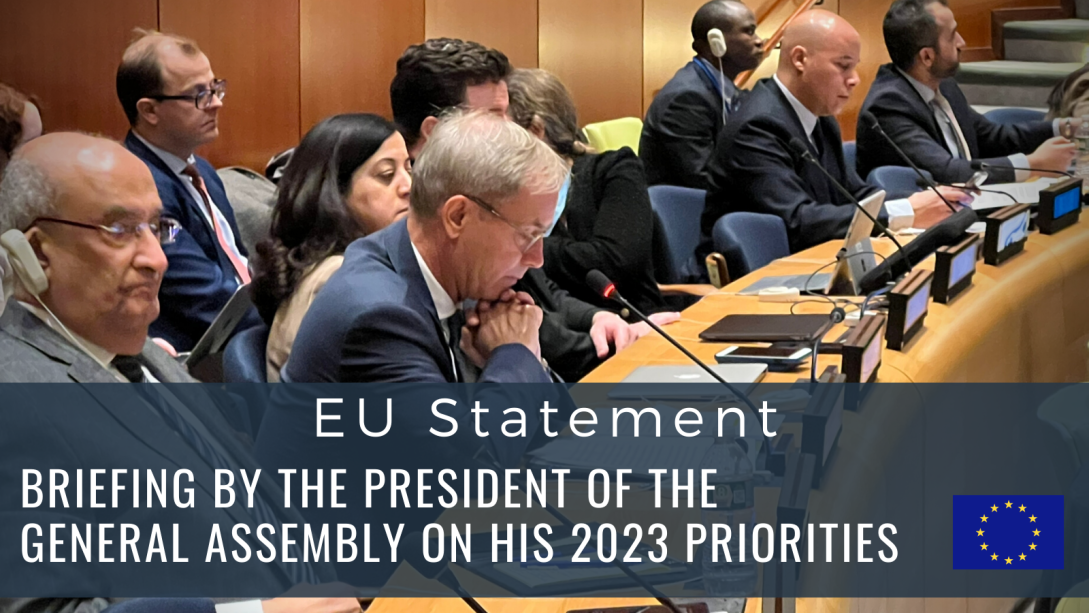EU Statement – UN General Assembly: Briefing by the President of the General Assembly on his 2023 priorities

Thank you, Mr President for this opportunity and your presentation.
I am delivering this statement on behalf of the EU and its Member States. The Candidate Countries North Macedonia, Montenegro, Serbia, Albania, Ukraine, the Republic of Moldova and Bosnia and Herzegovina, and the potential candidate country Georgia align themselves with this statement.
Mr President, in the current perfect storm, the UN is under unprecedented pressure. The multilateral system’s ability to deliver depends on the UN’s ability to deliver. Against this context and as we are advancing ‘Our Common Agenda’, your staunch support, Mr President, to multilateralism and a reformed UN at its core is vital
We are looking forward to working with all those who believe in the UN and the Charter towards a stronger and more effective and networked multilateralism, one that truly delivers on the most urgent needs of our time.
We already have the toolbox and our roadmap to address the most urgent needs, which have grown further due to Russia’s unprovoked aggression against Ukraine. Now we have to get our priorities and level of ambition right. The urgency to accelerate the implementation of the 2030 Agenda could therefore not be bigger. 2023 must be a year of delivery!
We must make the most of the upcoming high-level events, first and foremost, the SDG Summit. The EU and its Member States will be fully mobilized to ensure this Summit becomes a success.
The implementation of ‘Our Common Agenda’ also provides an important opportunity to accelerate the implementation of the SDGs. Both processes are closely intertwined. With the co-facilitators you appointed, Mr President, we are in very good hands to ensure complementarity and successful outcomes, including for the preparatory Ministerial meeting for next year’s Summit of the Future.
Other major events will be the LDC5 Summit - where we stand ready to reconfirm our full support and partnership towards the Least Developed Countries - and the UN Water Conference as the main SDG-specific conference this year and critical for the entire 2030 Agenda as well as other UN processes.
The EU will also remain a staunch supporter of an ambitious climate and biodiversity agenda.The Global Biodiversity Framework adopted in December provides a new roadmap to protect, restore and use nature more sustainably. We will partner with the most vulnerable and biodiverse countries to ensure its swift implementation. The Climate Ambition Summit in September will be another important occasion to foster our joint commitments ahead of COP28.
Lastly, we are fully cognizant of the tremendous economic pressure countries are going through where the debt crisis is another major concern and obstacle to the full implementation of the Agenda 2030.
The “Global Gateway” is the EU’s contribution to accelerate the implementation of the SDGs. It is a sustainable offer for the environment, financing, and with regard to debt – and a major contribution towards the SDGs. Until 2027, the EU will mobilize up to 300 billion Euros of investments in the areas of digital, climate and energy, transport, health, education and research.
In the area of peace and security, we must ensure that the UN is not paralyzed when the Security Council is blocked. Last year’s adoption of a “standing mandate” for a GA debate when a veto is cast has contributed to revitalising and empowering this body, and to precisely giving the UN a voice.
The convening of the Emergency Special Session has also proven very effective to ensure this Assembly responds to urgent crises, such as the one triggered by Russia’s aggression against Ukraine. The world needed to hear the overwhelming support in defence of the UN Charter, respect for international law and for ensuring accountability.
We also must continue addressing the collateral, multi-dimensional crises resulting from the aggression, which has hit the most vulnerable countries the hardest.
You as President of this body also hold a particular responsibility in defending the Charter and we trust that you will continue to do so. Impartiality cannot mean indifference to injustice.
Addressing injustice also means promoting and defending human rights and fundamental freedoms. Human Rights, including economic social and cultural rights, are universal and a core pillar of the UN. Defending them must be mainstreamed in our work. This includes promoting gender equality and the empowerment of all women and girls. We count on your continued engagement in this respect, Mr President.
We must ensure sufficient funding for human rights and at the same time ensure civil society’s invaluable input to the functioning of this body, especially given their increasingly shrinking space, including in the NGO Committee.
Mr President, the UN’s humanitarian action as one of the main achievements of the multilateral system is also key to ensure that no one is left behind. As to preserve it, the GA must continue to adopt all humanitarian resolutions by consensus.
Lastly, the key element for a reformed and reinvigorated multilateralism is to change the way we work. This begins with the basics: streamlining our agendas and focusing them on our agreed priorities – most notably the Agenda 2030, and ‘Our Common Agenda’.
Let us use the process of GA revitalisation for making further gains. The pandemic has shown us that not every process requires yearly negotiations.
The pandemic has also taught us that we need all stakeholders – women, youth, civil society, academia, parliaments, the scientific community, the private sector - around the table to think out of the box and come up with innovative solutions. As you said, governments do not hold a monopoly on knowledge.
Lastly, we fully share your pledge to making better use of science and data towards an effective and innovative transformation. Those are key cornerstones of ‘Our Common Agenda’ and the SG’s vision for a UN 2.0 and you can count on the EU’s full support towards achieving these goals.
I thank you.
